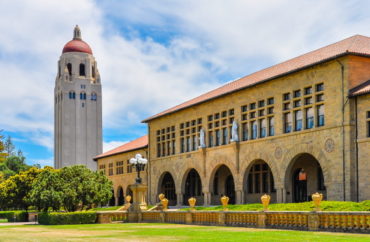
Institution leaders appear to walk back guide, but one student argues they’re being disingenuous
Stanford University has announced that a controversial language guide that warns against using the term “American” is under review.
The university made the statement Dec. 20 after news reports reported circulated detailing a 13-page “Elimination of Harmful Language Initiative” created at the institution that also advised against saying dozens of other innocuous words and phrases, prompting nationwide outrage and ridicule.
Stanford’s statement, signed by campus spokesman Steve Gallagher, emphasized the guide is not official university policy and was developed to provide “advice for the IT community at Stanford about word choices in Stanford websites and code.”
Gallagher added:
We have particularly heard concerns about the guide’s treatment of the term “American.” We understand and appreciate those concerns. To be very clear, not only is the use of the term “American” not banned at Stanford, it is absolutely welcomed [emphasis in the original].
The intent of this particular entry on the EHLI website was to provide perspective on how the term may be imprecise in some specific uses, and to show that in some cases the alternate term “US citizen” may be more precise and appropriate. But, we clearly missed the mark in this presentation.
This guide for the university’s IT community is undergoing continual review. The spirit behind it, from the beginning, has been to be responsive to feedback and to consider adjustments based on that feedback. We value the input we have been hearing, from a variety of perspectives, and will be reviewing it thoroughly and making adjustments to the guide.
One Stanford student has called out Stanford leaders as disingenuous in their response to the controversy.
Writing in the Stanford Review, a center-right independent student publication, editor Mimi St. Johns argued their response downplays the true intensions of the “Elimination of Harmful Language Initiative,” pointing out:
The original guide describes the initiative as one of the “actions prioritized in the Statement of Solidarity and Commitment to Action” (a multi-year plan launched in 2020 after the Black Lives Matter riots). This Solitary Statement (written by a joint group of Stanford professional committees) describes itself as a “plan that puts actions behind mere words.”
Let’s do a little recap… Apparently, the actual actions behind these words were to release a style guide so asinine that “American,” “he” and “she,” and even the liberal rallying cry “trigger warning” were on the list of non-PC words. The guide soon was ridiculed by thousands on social media, Elon Musk tweeted about it, and it even caught the ire of many liberals. It was then that university admins decided to huddle together and have the IT Department assert the guide was no longer a University initiative but simply a list of tacit suggestions. …
After failing in the public sphere, the ‘harmful language’ guide then became aspirational. The update statement states the guide’s “aspiration, and the reason for its development is to support an inclusive community.” They aspire to use it someday in the future. In other words, it was a serious document but they won’t enact this speech guide now. But, ten years down the line when America could be woke enough (and sufficiently pro-censorship) to tolerate it, they will. Allegedly, this is because enforcement of the initiative means “supporting an inclusive community.” …
Though adding the word “American” to a list of harmful language is absurd, it shouldn’t be our main takeaway from the situation. The more important question is what kind of culture creates an “initiative” to change basic functions of human speech? Further, what kind of administration either encourages it or gives enough leeway to a bureaucratic IT committee that they try to enact it?
This is not the first time the word “American” has come under fire in a university language guide. In 2019, Colorado State University’s Inclusive Communications Task Force had deemed the words “America” and “Americans” non-inclusive.
In 2015, a “Bias-Free Language Guide” posted by the University of New Hampshire declared the word American “problematic.”
MORE: Here are 14 times campus hate crimes turned out to be hoaxes in 2022
IMAGE: J. Jim / Shutterstock
Like The College Fix on Facebook / Follow us on Twitter




Please join the conversation about our stories on Facebook, Twitter, Instagram, Reddit, MeWe, Rumble, Gab, Minds and Gettr.